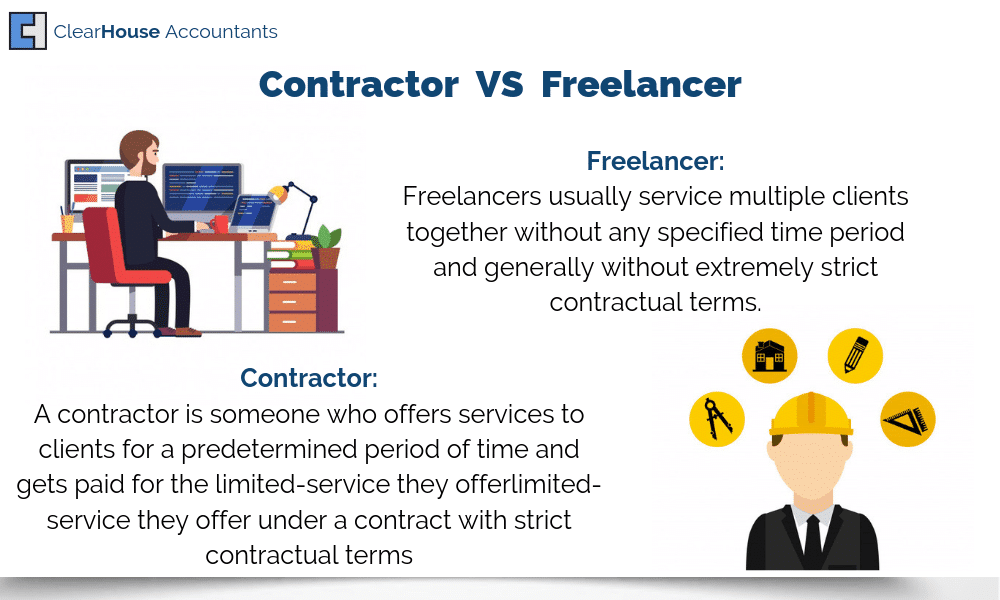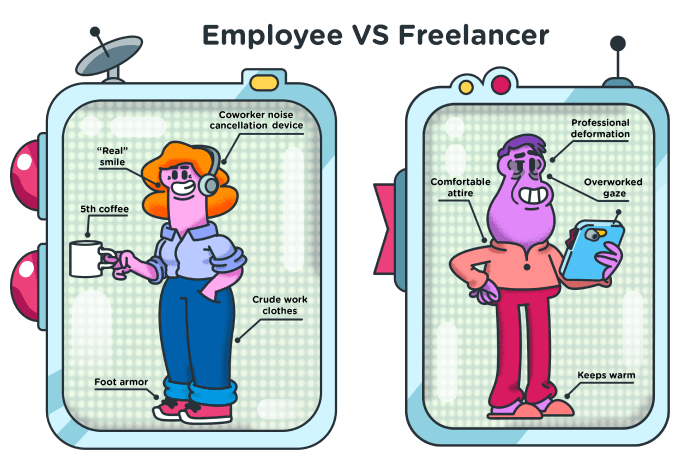In the world of work, the terms “freelancer” and “self-employed” are often used interchangeably. However, it is important to recognize that there are significant differences between these two forms of employment. Understanding these distinctions is crucial for individuals looking to establish their own businesses or pursue a career in freelancing. By delving into the nuances of freelance vs. self-employment, you can gain valuable insights into how to position yourself and your business.
What Sets Freelancers Apart from Self-Employed Individuals?
While there are similarities between freelancers and self-employed individuals, particularly in terms of independence and entrepreneurial spirit, there are several key differences that set them apart. Let’s explore these distinctions in more detail.
1. Client Relationships
One of the primary differences between freelancers and self-employed individuals lies in their relationships with clients. Freelancers typically work on a project basis, accepting work from various clients. They enter into contracts, negotiate terms, and perform specific tasks or services for their clients. In essence, freelancers are hired to complete specific assignments.
On the other hand, self-employed individuals own and operate their own businesses. Instead of relying on individual client contracts, they focus on building long-term relationships with customers. These individuals sell products or services directly to customers, often establishing a more consistent stream of work.

2. Work Dynamics
Freelancers tend to work independently, handling all aspects of their projects on their own. They are often solo practitioners, relying solely on their own expertise and skills to deliver high-quality work. This autonomy allows freelancers to have complete control over their work schedules, rates, and the clients they choose to work with.
In contrast, self-employed individuals often have a team or employees working under them. This additional support enables them to handle larger-scale projects and expand their business operations. By delegating tasks to their team, self-employed individuals can focus on growing their business and managing client relationships.
3. Work Arrangements
Freelancers have the flexibility to work on their projects alongside other commitments, such as a full-time job. Many freelancers start by taking on side gigs to supplement their income or explore their passion projects. This arrangement allows them to test the waters of freelancing without fully committing to it.
On the other hand, self-employed individuals dedicate their time exclusively to their own business. They work solely for themselves, without any other employer or source of income. This level of commitment often leads to a more significant investment of time and effort into building and growing their business.
4. Workload and Commitments
Freelancers often juggle multiple projects simultaneously, working on various assignments for different clients. They have the freedom to take on as many or as few projects as they desire, depending on their capacity and availability. This multitasking ability allows freelancers to diversify their income streams and explore different areas of expertise.
Self-employed individuals may also work with multiple clients or companies, but they typically structure their business operations differently. Rather than openly advertising their work with various clients, self-employed individuals often operate under a company name. They funnel contracts and projects through their business, establishing a more cohesive and branded presence in the market.
5. Client vs. Customer Focus
Freelancers typically have clients, while self-employed individuals deal with customers. Although these terms are sometimes used interchangeably, they carry distinct meanings. Clients are individuals or organizations that require specific work performed for them. They often have more influence over the terms and conditions of a contract.
Customers, on the other hand, seek products or services to fulfill their needs or desires. They look for a service or product to purchase based on various factors such as quality, price, or convenience. Self-employed individuals focus on attracting and satisfying the needs of their customers, often with a broader range of offerings.
The Importance of Proper Classification

Understanding whether you fall into the category of freelancer or self-employed is crucial for several reasons. Proper classification impacts various aspects of your work and can significantly affect your financial and legal obligations. Let’s explore some of the key reasons why proper classification matters.
1. Tax Management
Proper classification ensures that you understand your tax obligations and responsibilities. As a freelancer, you are considered an independent contractor, responsible for reporting your income and paying self-employment taxes. Your clients are not required to withhold income, Medicaid, or Social Security taxes on your behalf.
However, if you are mistakenly classified as an independent contractor when you should be an employee, you may miss out on certain benefits. Employees receive benefits such as vacation days, sick leave, worker’s compensation, and health care insurance. Misclassification can lead to financial and legal complications, so it is crucial to ensure accurate classification.
2. Benefits and Perks
Classifying yourself correctly also ensures that you have access to benefits and perks that are typically associated with your employment status. As a freelancer, you may not have access to traditional employment benefits, such as paid time off or health insurance. Understanding your classification helps you make informed decisions about securing benefits and planning for your future.
3. Setting Expectations
Proper classification helps set clear expectations for both yourself and your clients or customers. By understanding your employment status, you can communicate your availability, work schedule, and project timelines more effectively. This clarity helps establish trust and ensures that all parties involved have a mutual understanding of the working relationship.
4. Hiring Employees or Freelancers
If you plan to expand your business and hire employees or freelancers, proper classification becomes even more critical. Employers must classify their workers correctly to comply with labor laws and avoid potential legal disputes. Hiring individuals as employees or contractors impacts their rights, benefits, and legal protections, so it is essential to classify them accurately.
Choosing the Right Path for You
When deciding whether to pursue a freelance career or establish yourself as a self-employed individual, several factors come into play. Your personal preferences, goals, and circumstances will ultimately determine the best path for you. Let’s explore the advantages and disadvantages of freelancing and self-employment to help you make an informed decision.

Pros of Freelancing
Freelancing offers several advantages that attract individuals seeking flexibility and autonomy in their work. Some of the key benefits include:
-
Control over Work: Freelancers have the freedom to choose the clients they want to work with and the projects they take on. This control allows them to align their work with their values and passions.
-
Flexible Schedule: Freelancers can design their work schedules according to their preferences. Whether it’s working part-time or setting unconventional hours, freelancers enjoy the freedom to manage their time.
-
Diverse Clientele: Working with multiple clients exposes freelancers to different industries, projects, and challenges. This variety keeps their work engaging and allows them to continuously learn and grow.
-
Potential for Higher Earnings: As freelancers gain experience and establish a strong reputation, they can command higher rates for their services. The ability to take on multiple projects simultaneously also contributes to their earning potential.
Cons of Freelancing
While freelancing offers many benefits, there are also some challenges to consider:
-
Irregular Income: Freelancers face the uncertainty of inconsistent work and income. The flow of projects can vary, making it challenging to predict monthly or yearly earnings accurately.
-
Client Dependence: Freelancers rely on clients for work and payment. If a client terminates a contract prematurely or fails to pay for completed work, it can disrupt cash flow and create financial difficulties.
-
Self-Marketing: Freelancers are responsible for finding and securing clients. This requires consistent self-promotion, networking, and marketing efforts to maintain a steady stream of projects.
-
Lack of Benefits: Freelancers are typically not entitled to employee benefits such as health insurance, retirement plans, or paid time off. They must factor in these additional expenses when managing their finances.
Pros of Self-Employment
Self-employment offers unique advantages for individuals looking to build their own business and chart their own path. Some of the key benefits include:
-
Entrepreneurial Freedom: As a self-employed individual, you have the freedom to pursue your passion and build a business around it. You have the opportunity to shape your own destiny and create something meaningful.
-
Complete Control: Being your own boss means you have the final say in all business decisions. You can set your own goals, determine your work processes, and shape your company culture according to your vision.
-
Unlimited Growth Potential: The success of your business is directly tied to your efforts. There is no limit to how much you can grow and expand your business, allowing you to achieve your financial and professional goals.
-
Brand Building: Self-employed individuals have the opportunity to build a strong brand and establish a reputation in their industry. A well-known and respected brand can attract a loyal customer base and open doors to new opportunities.
Cons of Self-Employment

Despite the many advantages, self-employment also comes with its own set of challenges:
-
Higher Tax Obligations: Self-employment taxes can be higher than taxes paid by employees. As a self-employed individual, you are responsible for managing your tax obligations, including quarterly payments and potentially higher tax rates.
-
Lack of Benefits: Self-employed individuals do not have access to traditional employment benefits like health insurance, retirement plans, or paid time off. Planning for personal and financial stability becomes crucial in the absence of employer-provided benefits.
-
Increased Responsibility: Running your own business requires wearing multiple hats and taking on various responsibilities. You must handle everything from client acquisition and project management to financial planning and administrative tasks.
-
Financial Uncertainty: Building a successful business takes time, effort, and financial investment. Initially, income may be unpredictable, and profitability may take longer to achieve. Self-employed individuals must be prepared for financial uncertainty during the early stages of their business.
Wrapping Up
In the freelance vs. self-employed debate, there is no definitive right or wrong choice. Both paths offer unique opportunities and challenges, and the decision ultimately comes down to your personal preferences and goals. Whether you choose to become a freelancer or embark on the self-employment journey, it is essential to understand the distinctions between the two and make an informed choice.
Remember, starting an online business requires dedication and hard work. To kickstart your journey, consider learning about Google Analytics and how it can enhance your marketing efforts. Understanding this powerful tool will help you track and analyze data to make informed business decisions and drive success in the digital realm.
